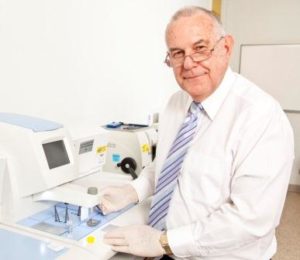 The Australian Cancer Research Foundation (ACRF) Cancer Prevention Unit at Flinders Centre for Innovation in Cancer (FCIC) was launched this morning by the Minister for Health, the Honourable John Hill with an announcement about world-leading research conducted in partnership with the Unit.
The Australian Cancer Research Foundation (ACRF) Cancer Prevention Unit at Flinders Centre for Innovation in Cancer (FCIC) was launched this morning by the Minister for Health, the Honourable John Hill with an announcement about world-leading research conducted in partnership with the Unit.
A long term supporter of the vision for the new FCIC (pictured) and cancer prevention research, the ACRF provided $1 million to set up the Cancer Prevention Unit.
“We at the ACRF are thrilled to have made such promising research possible at the FCIC,” said ACRF Chairman Mr Tom Dery.
“The ACRF Cancer Prevention Unit will allow the world-class researchers at Flinders to pursue a range of cancer prevention initiatives – from behavioural, diet and environmental studies to improving early detection and screening programs.”
The preventive focus of the new facility will not only significantly impact on quality of life and health outcomes across South Australia and indeed, the world, but it will also help to reduce the costs of cancer on our health system.
“The Unit is about saving lives through innovative cancer prevention strategies,” said Professor Graeme Young (pictured), a Flinders University leading researcher based in the Cancer Prevention Unit.
“Cancer doesn’t form overnight, some cancers can take up to 10 years to develop and it is thanks to organisations like the ACRF that our vision of preventing cancer from developing or progressing to such a debilitating state can be achieved,” said Professor Young.
The team of researchers from the ACRF Cancer Prevention Unit have been able to develop a breakthrough blood test to detect colorectal cancer in collaboration with CSIRO and Clinical Genomics Pty Ltd.
Despite being the second most commonly diagnosed cancer in Australia, screening programs for colorectal cancer, such as the National Bowel Cancer Screening Program, have lower participation than other forms of cancer screening due, in part, to the nature of the faecal testing that has traditionally been offered.
“There are tests for bowel cancer currently in clinical use. While these tests are saving lives, a more sensitive and specific test that attracts higher public uptake would be really valuable,” says Dr Trevor Lockett from CSIRO’s Preventative Health Flagship.
The new test is based on gene biomarkers for colorectal cancer that can be detected in blood.
“Our research shows that people overwhelmingly prefer the idea of a blood test for colorectal cancer screening over the current faecal test,” said FCIC researcher Jo Osborne. “This new approach could improve participation in screening programs, which could lead to more lives being saved through early intervention.”
The team within the ACRF Cancer Prevention Unit at FCIC has been a long term partner with CSIRO and Clinical Genomics in the development of the test and initial clinical trials have been performed at Flinders.
The new test has shown good results for cancer detection and a low rate of false positives in initial trials. Expanded clinical trials with the cancer blood test are now underway and Clinical Genomics aims to launch the test commercially in 2013.
“Our aim has been to develop an accurate blood test for colorectal cancer to provide patients with an alternative to traditional stool-based testing. This gene test is a major breakthrough and results have exceeded all our expectations,” said Larry LaPointe, CEO of Clinical Genomics, one of the key partners together with CSIRO and Flinders University.

